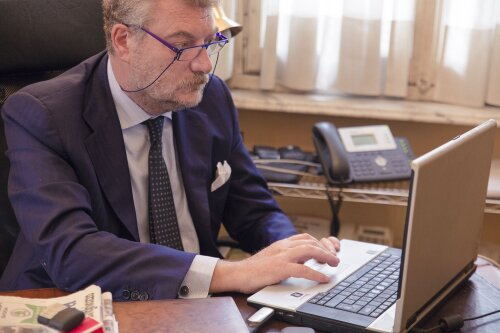Best Brokerage Lawyers in Turin
Share your needs with us, get contacted by law firms.
Free. Takes 2 min.
Free Guide to Hiring a Real Estate Lawyer
List of the best lawyers in Turin, Italy
About Brokerage Law in Turin, Italy
Brokerage, or “mediazione” in Italian, is a regulated professional service that involves acting as an intermediary between parties seeking to conclude contracts, most commonly in real estate, insurance, and occasionally in business or financial transactions. Turin, as a major city in the Piedmont region, follows both national Italian laws and applicable local regulations regarding brokerage. Brokers (“mediatori”) play an essential role in facilitating transactions and are subject to specific duties, rights, and professional standards to ensure fair dealings between parties.
Why You May Need a Lawyer
Engaging a lawyer for brokerage matters can be critical in several situations:
- Disputes over brokerage commissions or payment terms.
- Misunderstandings regarding the scope of the broker’s authority or obligations.
- Issues relating to the registration, licensing, or compliance of brokers.
- Suspected malpractice, such as misrepresentation or conflict of interest.
- Drafting, reviewing, or negotiating brokerage agreements or contracts.
- Unlawful practices or violations of consumer protection provisions.
- Cross-border transactions, where international parties are involved.
Legal advice ensures your rights are protected and helps prevent costly errors or litigation.
Local Laws Overview
Brokerage activities in Turin are governed primarily by the Italian Civil Code, specifically Articles 1754 to 1765. These laws define who is considered a broker, their duties, rights to commission, and obligations of the parties involved. Key aspects include:
- Brokers must be impartial intermediaries, not representing the interests of any single party exclusively unless specified.
- Registration in Italy’s Chamber of Commerce’s Register of Brokers (Ruolo dei Mediatori) is required to legally operate as a broker.
- Brokers are entitled to a commission when their efforts lead to the successful conclusion of a contract between parties.
- Disclosure of any interests, relationships, or conflicts is mandatory for transparency.
- Specific obligations exist for real estate brokers, such as verifying the legal status of properties and providing accurate information to clients.
- Consumer protection laws and anti-fraud provisions must be observed in all brokerage activities.
Regional and municipal regulations in Turin may impose additional standards or administrative steps, particularly for real estate transactions.
Frequently Asked Questions
What does a broker do in Turin, Italy?
A broker acts as an intermediary, facilitating agreements between parties (e.g., buyers and sellers) and helping them reach mutually beneficial contracts, often in real estate or commercial transactions.
How do I verify if a broker is properly licensed in Turin?
You can check the broker’s registration with the Turin Chamber of Commerce or inquire about their “Ruolo dei Mediatori” certificate, which demonstrates they meet legal requirements.
What fees or commissions can I expect to pay?
Brokerage commissions are typically negotiated and outlined in advance, but must be fair and comply with local market standards and any applicable collective agreements.
Is a written contract with a broker mandatory?
Although oral agreements may be valid, a written contract is highly recommended for clarity and to avoid disputes regarding obligations and commissions.
What happens if more than one broker is involved?
If multiple brokers facilitate a transaction, they may share the commission proportionally, depending on their involvement and existing agreements.
Can brokers represent both parties in a transaction?
Brokers often act as neutral intermediaries for both sides, but must disclose any existing relationships or conflicts of interest and maintain impartiality.
What are my rights if a broker provides misleading information?
If a broker gives false or incomplete information, clients may be entitled to compensation and can initiate legal action. Consumer protection laws in Italy offer additional remedies.
Are brokers regulated differently for real estate and financial services?
While basic principles of brokerage apply broadly, specific regulations exist for different sectors. Real estate brokers, for example, face stricter due diligence and disclosure obligations.
Can I refuse to pay a brokerage fee?
If a broker acts unlawfully, fails to disclose conflicts, or if no actual agreement is reached due to their actions, you may have grounds to contest payment. Legal advice is recommended in such cases.
How can a lawyer help me in a brokerage matter?
A lawyer can review contracts, negotiate terms, verify broker credentials, advise on legal risks, and represent you in disputes or litigation involving brokers.
Additional Resources
For those seeking more information or assistance related to brokerage in Turin, consider the following:
- Chamber of Commerce of Turin (Camera di Commercio di Torino): Registers brokers and provides public information on licensed practitioners.
- Consiglio Nazionale dei Mediatori (National Council of Brokers): Offers guidance, professional resources, and standards for brokers in Italy.
- Italian Consumer Protection Associations (e.g., Codacons, Altroconsumo): Offer advice and support for clients facing issues with brokers.
- Local bar associations (Ordine degli Avvocati di Torino): Can refer you to lawyers specializing in brokerage law.
- Italian Ministry of Economic Development: Provides legal guidelines and regulatory updates on the brokerage profession.
Next Steps
If you require legal assistance related to brokerage in Turin, follow these steps:
- Document all relevant agreements, communications, and evidence related to your brokerage issue.
- Verify the broker’s credentials and check their registration with the Chamber of Commerce.
- Contact a local lawyer with experience in brokerage law for a consultation. The Turin bar association or Chamber of Commerce can provide referrals.
- Prepare a list of questions and concerns to ensure your lawyer fully understands your situation.
- Consider mediation or alternative dispute resolution options if a direct legal route seems excessive for the issue at hand.
Remember, getting timely legal advice is essential to protecting your rights and ensuring that your interests are safeguarded in any brokerage transaction in Turin, Italy.
Lawzana helps you find the best lawyers and law firms in Turin through a curated and pre-screened list of qualified legal professionals. Our platform offers rankings and detailed profiles of attorneys and law firms, allowing you to compare based on practice areas, including Brokerage, experience, and client feedback.
Each profile includes a description of the firm's areas of practice, client reviews, team members and partners, year of establishment, spoken languages, office locations, contact information, social media presence, and any published articles or resources. Most firms on our platform speak English and are experienced in both local and international legal matters.
Get a quote from top-rated law firms in Turin, Italy — quickly, securely, and without unnecessary hassle.
Disclaimer:
The information provided on this page is for general informational purposes only and does not constitute legal advice. While we strive to ensure the accuracy and relevance of the content, legal information may change over time, and interpretations of the law can vary. You should always consult with a qualified legal professional for advice specific to your situation.
We disclaim all liability for actions taken or not taken based on the content of this page. If you believe any information is incorrect or outdated, please contact us, and we will review and update it where appropriate.









